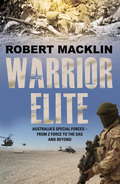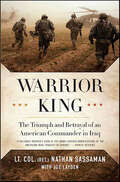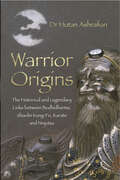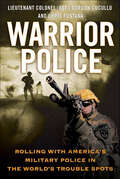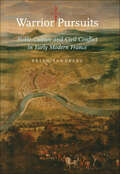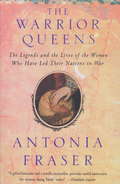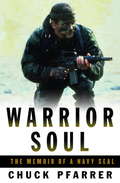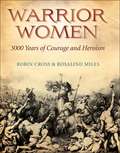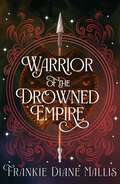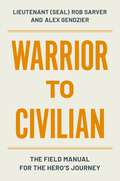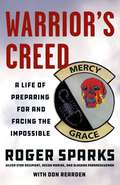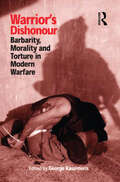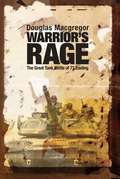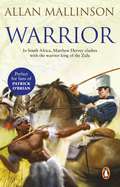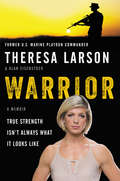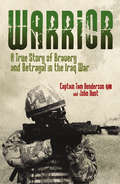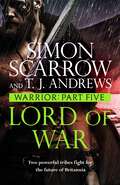- Table View
- List View
Warrior Elite: Australia's special forces Z Force to the SAS intelligence operations to cyber warfare
by Robert MacklinA compelling account of Australia's intelligence organisations and special forces - from the early days of the commandos during World War II through to the SAS of today and the cyber wars of the future. From the co-author of SAS Sniper.Warrior Elite is a unique and compelling account of Australia's special forces and intelligence operations - ranging from the early special forces of World War II to the establishment and development of the SAS and Commando Regiments as the elite fighters of today, and from the Australian Security Intelligence Service to the Australian Signals Directorate and ASIO. It is an authoritative, gripping and thoroughly up-to-date account of both the history and current state of our special forces and intelligence bodies - and gives a unique glimpse into the warfare of the future. Our future.Robert Macklin has conducted dozens of exclusive interviews and uncovered incredible, daring and sometimes heartbreaking stories of the elite troops that guard our nation and engage in secret operations around the world. He has had significant cooperation from numerous sources within the special forces and the various intelligence agencies.Both thoroughly researched and colourfully written, Warrior Elite will attract the reader of action memoirs as well as those interested in broader military history and espionage.
Warrior King: The Triumph and Betrayal of an American Commander in Iraq
by Joe Layden Nathan SassamanThe startling and controversial memoir of combat and betrayal, written by one of the most prominent members of the U.S. fighting forces in Iraq.A West Point graduate, a former star quarterback who carried Army to its first bowl victory, and a courageous warrior who had proven himself on the battlefield time and again, Lt. Col. Nathan Sassaman was one of the most celebrated officers in the United States military. He commanded more than eight hundred soldiers in the heart of the insurgency-ravaged Sunni Triangle in Iraq, and his unit's job was to seek out and eliminate terrorists and loyalists to Saddam Hussein, while simultaneously rebuilding the region's infrastructure and introducing democratic processes to a broken people. Sassaman's tactics were highly aggressive, his methods innovative, and his success in Iraq nearly unparalleled.Yet Sassaman will always be known for a fateful decision to cover up the alleged drowning of an Iraqi by his men, in which they purportedly forced two detainees to jump into the Tigris River. The army initially charged three soldiers with manslaughter and a fourth with assault---the first time troops who served in Iraq have been charged with a killing in connection with the handling of detainees. Sassaman's decision led to his downfall, despite an impressive career, and sent shock waves through the American military.This controversial decision goes to the heart of the complex fight in Iraq, where key army leaders betray one another, politics in the war room leads to lost lives on the battlefield, and enemy factions routinely sabotage U.S. efforts, making success difficult for American commanders on the battlefield.Warrior King is the explosive memoir of one of the most deeply involved members of the U.S. military in Iraq. This is the first book to take readers from the overnight brutality of combat to the daunting daytime humanitarian tasks of rebuilding Iraq to the upper echelons of the Pentagon to show how and why the war has gone horribly wrong.
Warrior Nation: Rebranding Canada in an Age of Anxiety
by Jamie Swift Ian McKayOnce known for peacekeeping, Canada is becoming a militarized nation whose apostles—-the New Warriors-—are fighting to shift public opinion. New Warrior zealots seek to transform postwar Canada’s central myth-symbols. Peaceable kingdom. Just society. Multicultural tolerance. Reasoned public debate. Their replacements? A warrior nation. Authoritarian leadership. Permanent political polarization. The tales cast a vivid light on a story that is crucial to Canada’s future; yet they are also compelling history. Swashbuckling marauder William Stairs, the Royal Military College graduate who helped make the Congo safe for European pillage. Vimy Ridge veteran and Second World War general Tommy Burns, leader of the UN’s first big peacekeeping operation, a soldier who would come to call imperialism the monster of the age. Governor General John Buchan, a concentration camp developer and race theorist who is exalted in the Harper government’s new Citizenship Guide. And that uniquely Canadian paradox, Lester Pearson. Warrior Nation is an essential read for those concerned by the relentless effort to conscript Canadian history.
Warrior Origins: The Historical and Legendary Links between Bodhidharma, Shaolin Kung-Fu, Karate and Ninjutsu
by Hutan AshrafianWarrior Origins is an account of the history and legends of the world’s prominent martial arts and how they share a common heritage. It chronicles the origins of the Shaolin warrior monks, Shaolin Kung-Fu and their celebrated founder, Bodhidharma, who is also considered the first patriarch of Zen (Chan) Buddhism. The book considers Bodhidharma’s origins in the context of ancient Persia and its royal houses and continues with the rise of Karate from ancient Okinawan roots to Japan and then into a global sport. It connects the record of Ninja and Ninjutsu and the influence of some of its latter luminaries, including Seiko Fujita, whilst also revealing new evidence on renowned martial artists such as Bruce Lee. This work takes a dramatically original approach to the heart of the martial arts and their founders. Author Dr Hutan Ashrafian, who holds black belt grades in several martial art styles, including a 5th Dan in Okinawan Goju-Ryu Karate and championship medals in Karate and Judo at World and European Masters level, delineates the inheritance of these arts using innovative evolutionary approaches to find previously unidentified links between them. Warrior Origins traces the pattern from Bodhidharma to the remarkable diversity of modern martial arts.
Warrior Peoples of East Africa 1840-1900
by Raffaele Ruggeri C. J. PeersLess well known than the Zulu of South Africa, the warriors of East Africa had just as fearsome a reputation. This fascinating study, illustrated with rare early drawings and meticulous colour plates, covers six of most prominent tribes. The prowess of the lion-hunting Masai deterred all foreign penetration for most of the 19th century; the Ngoni, driven north by the Zulu, revolutionized warfare in the region; the HeHe put up fierce resistance to German colonisers; the Ruga-Ruga produced two formidable warlords and adorned themselves with bloody trophies; the Nandi showed reckless bravery even against machine guns; and the Turkana dominated one of the most pitiless wildernesses in all of Africa.
Warrior Police: Rolling with America's Military Police in the World's Trouble Spots
by Gordon Cucullu Chris FontanaFor the first time ever, author Gordon Cucullu gives readers an explosive inside look at modern military police units and their role in defending our freedom.America has been at war on several fronts since the 9/11 attack. While public attention has focused on Marines, conventional Army units, and Special Operations Forces, a lion's share of the war-fighting has been done, under media radar, by Military Police units. These squad and platoon-sized units patrol dangerous urban streets, build up local police units to improve neighborhood stability, and conduct civic action missions. On many occasions they have rushed into a vicious firefight to come to the assistance of infantry units in desperate straits. They keep villages Taliban-free, monitor balloting sites, and interdict drug shipments. In detention centers at Camp Bucha, Iraq, Bagram, Afghanistan, and Guantanamo, Cuba they guard some of the most dangerous terrorists in history.The story is told by the soldiers themselves, recounting what they have seen and experienced, along with historical context and first-hand field observations by the author team who were provided with unique inside access. Warrior Police takes readers into the bloody streets of Iraq, the dangerous back-country of Afghanistan, and wherever our Military Police are needed.
Warrior Pursuits: Noble Culture and Civil Conflict in Early Modern France (The Johns Hopkins University Studies in Historical and Political Science #128)
by Brian SandbergHow did warrior nobles’ practices of violence shape provincial society and the royal state in early seventeenth-century France?Warrior nobles frequently armed themselves for civil war in southern France during the troubled early seventeenth century. These bellicose nobles’ practices of violence shaped provincial society and the royal state in early modern France. The southern French provinces of Guyenne and Languedoc suffered almost continual religious strife and civil conflict between 1598 and 1635, providing an excellent case for investigating the dynamics of early modern civil violence. Warrior Pursuits constructs a cultural history of civil conflict, analyzing in detail how provincial nobles engaged in revolt and civil warfare during this period. Brian Sandberg’s extensive archival research on noble families in these provinces reveals that violence continued to be a way of life for many French nobles, challenging previous scholarship that depicts a progressive "civilizing" of noble culture. Sandberg argues that southern French nobles engaged in warrior pursuits—social and cultural practices of violence designed to raise personal military forces and to wage civil warfare in order to advance various political and religious goals. Close relationships between the profession of arms, the bonds of nobility, and the culture of revolt allowed nobles to regard their violent performances as "heroic gestures" and "beautiful warrior acts." Warrior nobles represented the key organizers of civil warfare in the early seventeenth century, orchestrating all aspects of the conduct of civil warfare—from recruitment to combat—according to their own understandings of their warrior pursuits.Building on the work of Arlette Jouanna and other historians of the nobility, Sandberg provides new perspectives on noble culture, state development, and civil warfare in early modern France. French historians and scholars of the Reformation and the European Wars of Religion will find Warrior Pursuits engaging and insightful.
Warrior Queens: The Legends and the Lives of the Women Who Have Led Their Nations in War
by Antonia FraserIn this panoramic work of history, Lady Antonia Fraser looks at women who led armies and empires: Cleopatra, Isabella of Spain, Jinga Mbandi, Margaret Thatcher, and Indira Gandhi, among others.
Warrior Soul
by Chuck Pfarrer"Since the first navy frogmen crawled onto the beaches of Normandy, no SEAL has ever surrendered," writes Chuck Pfarrer. "No SEAL has ever been captured, and not one teammate or body has ever been left in the field. This legacy of valor is unmatched in modern warfare."Warrior Soul is a book about the warrior spirit, and it takes the reader all over the world. Former Navy SEAL Chuck Pfarrer recounts some of his most dangerous assignments: On a clandestine reconnaissance mission on the Mosquito Coast, his recon team plays a deadly game of cat and mouse with a Nicaraguan patrol boat. Cut off on the streets of Beirut, the author's SEAL detachment must battle snipers on the Green Line. In the mid-Atlantic, Pfarrer's unit attempts to retrieve--or destroy--the booster section of a Trident ballistic missile before it can be recovered by a Russian spy trawler. On a runway in Sicily, his assault element surrounds an Egyptian airliner carrying the Achille Lauro hijackers.These are only a few of the riveting stories of combat patrol, reconnaissance missions, counter-terrorist operations, tragedies, and victories in Warrior Soul that illustrate the SEAL maxim "The person who will not be defeated cannot be defeated."From the Hardcover edition.
Warrior Women
by Rosalind Miles Robin CrossFrom earliest times, women gained access to leadership in times of conflict and proved themselves equal to the challenge of commanding during war. Women leaders abounded in the ancient world from Ireland to Israel, sometimes through the accident of birth, but often rising to power through naked opportunism and raw courage in the ranks--and it is no accident that women war leaders, like men, are often famous for their strong sexual drive. Wherever there is war, there has often been a woman at the helm. Later ages frequently wrote these women out of history, but their stories have refused to die. From the legendary leader of the Amazons who fought the greatest of Greek heroes, Achilles, to the Iron Ladies of today, the women of both West and East directing military campaigns and leading their countries in war. Presenting an array of fascinating and sometimes little known women war leaders, popular author Rosalind Miles and the acclaimed military historian Robin Cross do full justice to the achievements of these women, some of whose amazing stories have so far never been told.Warrior women include: Penthesilea the Amazons queen, Deborah, Cleopatra VII, Boudicca, Eleanor of Aquitaine, Joan of Arc, Elizabeth I, Grace O'Malley, Deborah Samson, Nadezda Durova, Harriet Tubman, Anna Etheridge, Soldaderas; Flora Sandes, Lily Litvak, Women of the Warsaw Ghetto, Hanna Reitsch, Ruth Werner, Jeanne Holm, Margaret Thatcher, Women in Today's Armies, Martha McSally and more. . .
Warrior Women: The Cultural Politics of Armed Women, c.1850–1945 (Elements in Modern Wars)
by Alison S. FellThis Element examines women warriors as vehicles of mobilisation. It argues that women warrior figures from the mid-nineteenth century until the end of the Second World War are best understood as examples of 'palimpsestic memory', as the way they were represented reflected new contexts while retaining traces of legendary models such as Joan of Arc, and of 'travelling memory', as their stories crossed geographical borders and were re-told and re-imagined. It considers both the instrumentalisation of women warriors by state actors to mobilise populations in the world wars, and by non-state actors in resistance, anti-colonial and feminist movements. Fell's analysis of a broad range of global conflicts helps us to understand who these actors were, what motivated them, and what meanings armed women embodied for them, enabling a fresh understanding of the woman warrior as an archetype in modern warfare.
Warrior of Ice
by Michelle WillinghamLocked in a deadly game! Physically and emotionally scarred, Lady Taryn knows no man would want her for a wife. Nonetheless, she's determined to free her father from his merciless overlord and enlists powerful warrior Killian MacDubh to help. He has his own motives for confronting the High King... Born a bastard, Killian longs to carve out a place for himself. Unaware of her true beauty, Taryn is an alluring distraction to his plan, but as traitors are revealed and loyalties tested, their forbidden love becomes the only thing worth fighting for!
Warrior of the Altaii
by Robert JordanEpic fantasy legend, and author of #1 New York Times bestselling series The Wheel of Time®, Robert Jordan's never-before published novel, Warrior of the Altaii:Draw near and listen, or else time is at an end.The watering holes of the Plain are drying up, the fearsome fanghorn grow more numerous, and bad omens abound. Wulfgar, a leader of the Altaii people, must contend with twin queens, warlords, prophets and magic in hopes of protecting his people and securing their future. Elspeth, a visitor from another world, holds the answers, but first Wulfgar must learn to ask the right questions. But what if the knowledge that saves the Altaii will also destroy them?“Jordan has come to dominate the world Tolkien began to reveal.” —The New York Times Explore Robert Jordan's epic fantasy masterpiece, and enter the realm of The Wheel of Time®Prequel: New Spring#1 The Eye of the World#2 The Great Hunt#3 The Dragon Reborn#4 The Shadow Rising#5 The Fires of Heaven#6 Lord of Chaos#7 A Crown of Swords#8 The Path of Daggers#9 Winter's Heart#10 Crossroads of Twilight#11 Knife of DreamsBy Robert Jordan and Brandon Sanderson#12 The Gathering Storm#13 Towers of Midnight#14 A Memory of LightBy Robert Jordan and Teresa PattersonThe World of Robert Jordan's The Wheel of TimeBy Robert Jordan, Harriet McDougal, Alan Romanczuk, and Maria SimonsThe Wheel of Time CompanionBy Robert Jordan and Amy RomanczukPatterns of the Wheel: Coloring Art Based on Robert Jordan's The Wheel of TimeAt the Publisher's request, this title is being sold without Digital Rights Management Software (DRM) applied.
Warrior of the Drowned Empire: the hotly anticipated fourth book in the Drowned Empire romantasy series (Drowned Empire Series #13)
by Frankie Diane MallisWarrior of the Drowned Empire is the highly-anticipated fourth book in a sensational romantic series. Perfect for fans of Jennifer L. Armentrout, Danielle L. Jensen, and Rebecca Yarros.The Guardians have returned.As Moriel's reincarnation nears, Lyr is determined to fulfil her oath: harness the power of the red shard and defeat him.But Lyr has uncovered the Empire's darkest secret - her cousin Jules still lives and the Emperor is enslaving vorakh for their forbidden magic. Now, she's vowed to bring the Empire to its knees.But freeing the realm will require more power than even Lyr and Rhyan combined possess. Their only opportunity is to make a far more sinister deal with the person who has the most to gain - and the person Rhyan trusts the least.To protect her loved ones, Lyr must master her magic or risk unleashing destruction across the Empire. It could cost her everything - her heart. And soul.A LUSH ROMANTASY, INSPIRED BY CLEOPATRA AND FEATURING A HIGH-STAKES MILITARY ACADEMY AND DEADLY FORBIDDEN ROMANCE.'One fantastical world. One fierce heroine to take it down! Daughter of the Drowned Empire is sexy, thrilling, and pure magic!' Cecy Robson, author of BloodguardReaders love the Drowned Empire series!'I haven't read a book that's dragged me in as much as this since I discovered Throne of Glass' ⭐⭐⭐⭐⭐'I loved this. The tension, angst - it was exactly what I look for in a good back!' ⭐⭐⭐⭐⭐'The romance is *chefs kiss*. For fans of Throne of Glass or people who like high fantasy!! It's worth it, I promise you' ⭐⭐⭐⭐⭐'This is the kind of book that I can definitely see conquering the heart of many and being the next surprise hit' ⭐⭐⭐⭐⭐'If you are ready for an ancient world full of mages, warriors, fallen gods, and forbidden love, then you need to read Daughter of the Drowned Empire IMMEDIATELY' ⭐⭐⭐⭐⭐
Warrior of the Drowned Empire: the hotly anticipated fourth book in the Drowned Empire romantasy series (Drowned Empire Series #4)
by Frankie Diane MallisWarrior of the Drowned Empire is the highly-anticipated fourth book in a sensational romantic series. Perfect for fans of Jennifer L. Armentrout, Danielle L. Jensen, and Rebecca Yarros.The Guardians have returned.As Moriel's reincarnation nears, Lyr is determined to fulfil her oath: harness the power of the red shard and defeat him.But Lyr has uncovered the Empire's darkest secret - her cousin Jules still lives and the Emperor is enslaving vorakh for their forbidden magic. Now, she's vowed to bring the Empire to its knees.But freeing the realm will require more power than even Lyr and Rhyan combined possess. Their only opportunity is to make a far more sinister deal with the person who has the most to gain - and the person Rhyan trusts the least.To protect her loved ones, Lyr must master her magic or risk unleashing destruction across the Empire. It could cost her everything - her heart. And soul.A LUSH ROMANTASY, INSPIRED BY CLEOPATRA AND FEATURING A HIGH-STAKES MILITARY ACADEMY AND DEADLY FORBIDDEN ROMANCE.'One fantastical world. One fierce heroine to take it down! Daughter of the Drowned Empire is sexy, thrilling, and pure magic!' Cecy Robson, author of BloodguardReaders love the Drowned Empire series!'I haven't read a book that's dragged me in as much as this since I discovered Throne of Glass' ⭐⭐⭐⭐⭐'I loved this. The tension, angst - it was exactly what I look for in a good back!' ⭐⭐⭐⭐⭐'The romance is *chefs kiss*. For fans of Throne of Glass or people who like high fantasy!! It's worth it, I promise you' ⭐⭐⭐⭐⭐'This is the kind of book that I can definitely see conquering the heart of many and being the next surprise hit' ⭐⭐⭐⭐⭐'If you are ready for an ancient world full of mages, warriors, fallen gods, and forbidden love, then you need to read Daughter of the Drowned Empire IMMEDIATELY' ⭐⭐⭐⭐⭐
Warrior to Civilian: The Field Manual for the Hero's Journey
by Robert Sarver Alex GendzierA compassionate, practical guidebook for veterans transitioning from active duty to civilian life and for the loved ones supporting their journey. "Challenging yet reassuring....a key addition to every veteran&’s packing list ." --Stan McChrystal, General, US Army (Ret) and Co-Founder and CEO, McChrystal Group Some important statistics: There are over 22 million veterans alive today Each year, more than 200,000 new veterans transition out of active duty. Approximately 22 veterans commit suicide a day, and even more are living with PTSD, traumatic brain injury (TBI), struggling with substance abuse, homelessness, and experience many, many other difficulties. It's clear that we have not honored the promise we make to veterans: that we as a country will help them after they've served and sacrificed. And while there are many books written by and for veterans, only a small selection of those address the transition to civilian life, and none are a truly complete reference for stepping out of service and back into normal life. Warrior to Civilian covers a range of topics, from the practical—finding a job, reintegrating into family life—to the more challenging topics, like dealing with loss, and finding new purpose in life. This well-curated resource incorporates stories, insights, and observations from veterans and their partners; evidence-based advice from health professionals and experts who work closely with veterans; and inspiration taken from heavyweights like Jon Kabbat-Zinn and Tony Robbins. The authors take care to address the unique challenges faced by veterans of color, and those in the LGBTQ+ communities. With support from some of our country's most recognizable military members, authors Rob Sarver, a former SEAL, and Alex Gendzier, combine their voices and their experiences in and out of the military in a unique way that will make this resource shine. Scaffolded by the hero's journey, in which the hero experiences a series of transformative events, they reveal that within the loss that many veterans have suffered while serving and suffer in the transition, there is great opportunity for healing.
Warrior's Creed: A Life of Preparing for and Facing the Impossible
by Don Rearden Roger SparksThe riveting story of how a young boy's upbringing with outlaw culture and charismatic role models forged him into an elite Marine and a decorated Pararescueman."Absence of self is my sword" comprises the final line in "The Warrior's Creed," a 14th century poem written by an unknown Japanese Samurai, and this is the code Master Sergeant Roger Sparks embodied as a Recon Marine turned Alaskan Pararescueman. A living legend in the military, Sparks first made a name for himself within elite Marine Reconnaissance units. He went on to become an instructor where he trained future Reconnaissance Marines with unorthodox and ancient indigenous warrior techniques. A decade later, the same methods would keep him and others alive, when he hoisted into a maelstrom of violence to rescue an embattled platoon in the rugged mountains of eastern Afghanistan. Introduced to a tough code of honor, family, and brotherhood from birth, Roger Sparks rose to become a distinguished instructor in Marine Reconnaissance and a Silver Star recipient as an Alaska Pararescueman. A raw and exhilarating tale of guts, grit, and heart, Warrior's Creed recounts the hidden side of special operations training, heroic and heartbreaking Alaskan wilderness rescues, and the surreal and deadly rescues during Operation Bulldog Bite in Afghanistan’s Watapur Valley. This powerful and inspirational story is as much of a self-help book as it is an edge of your seat military memoir. Warrior's Creed reveals a motivating and mindful approach to overcoming the odds, facing the impossible, and finding mercy and grace in the aftermath.
Warrior's Dishonour: Barbarity, Morality and Torture in Modern Warfare
by George KassimerisThe characteristic act of men at war is not killing. It is killing by committing shocking and unspeakable atrocities, when circumstances permit. What drives ordinary people into hatred, genocide, inhumanity and evil? What turns friends and neighbours against each other with such savagery? Where does such barbarity come from? This collection examines the anarchy, cruelty and overwhelming confusion of modern warfare. In particular it analyzes: ¢ what happens when morality vanishes from the battlefield and why torture is endemic in modern warfare; ¢ how human rights, in times of war, lose meaning as a set of principles; ¢ whether official propaganda and enemy demonization make barbaric behaviour easier; ¢ how we can develop cultures opposed to torture that damage the legitimacy of our societies. Through a wealth of case studies that have been carefully selected in terms of their themes, approaches and methodologies, this comprehensive volume provokes discussion and enhances understanding from a variety of disciplinary perspectives.
Warrior's Heart: Becoming a Man of Compassion and Courage
by Eric GreitensIn this adaptation of his best-selling book, The Heart and the Fist, Eric speaks directly to teen readers, interweaving memoir and intimate second-person narratives that ask the reader to put themselves in the shoes of himself and others. Readers will share in Eric's evolution from average kid to globe-traveling humanitarian to warrior, training and serving with the most elite military outfit in the world: the Navy SEALs. Along the way, they'll be asked to consider the power of choices, of making the decision each and every day to act with courage and compassion so that they grow to be tomorrow's heroes. Sure to inspire and motivate.
Warrior's Rage
by Douglas MacgregorOn 26 February 1991, cavalry troops of "Cougar Squadron," the 2nd Squadron of the 2nd Armored Cavalry Regiment, charged out of a sandstorm during Operation Desert Storm and caught Iraq's Republican Guard Corps in the open desert along the North-South grid line of a military map referred to as the "73 Easting." Taken by surprise, the defending Iraqi armor brigade was swept away in salvos of American tank and missile fire in what became the U.S. Army's largest tank battle since World War II. Douglas Macgregor, the man who trained and led Cougar Squadron into battle, recounts two stories. One is the inspiring tale of the valiant American soldiers, sergeants, lieutenants, and captains who fought and won the battle. The other is a story of failed generalship, one that explains why Iraq's Republican Guard escaped, ensuring that Saddam Hussein's regime survived and America's war with Iraq dragged on. Certain to provoke debate, this is the latest book from the controversial and influential military veteran whose two previous books, Breaking the Phalanx and Transformation Under Fire, are credited with influencing thinking and organization inside America's ground forces and figure prominently in current discussions about military strategy and defense policies. Its fast-moving battle narrative, told from the vantage point of Macgregor's Abrams tank, and its detailed portraits of American soldiers, along with vivid descriptions of the devastating technology of mounted warfare, will captivate anyone with a taste for adventure as well as an interest in contemporary military history.
Warrior: (The Matthew Hervey Adventures: 10): A gripping and action-packed military page-turner from bestselling author Allan Mallinson (Matthew Hervey #10)
by Allan MallinsonPerfect for fans of Patrick O'Brian, Bernard Cornwell and CS Forester, another breath-taking Matthew Hervey adventure from the pen of THE SUNDAY TIMES BESTSELLING AUTHOR Allan Mallinson."Captain Matthew Hervey is as splendid a hero as ever sprang from an author's pen" -- THE TIMES"Hervey's thrilling battles against the vivid backdrop of the developing British Empire make for richly engaging storytelling" -- DAILY MAIL"Highly addictive" -- ***** Reader review"This series just gets better and better" -- ***** Reader review********************************************************************************************1828: Matthew Hervey of the 6th Light Dragoons is urgently summoned to the Cape Colony when he learns that the Zulu warrior King Shaka is about to wage war.Soon Hervey, his old friend Eyre Somervile and their escort of dragoons and mounted rifles are riding north. When they arrive at Shaka's kraal, it quickly becomes apparent that he has slaughtered thousands of his subjects - warriors and women alike.When Shaka is killed by his own people, and the region plunged into civil war, Hervey and his men find themselves in the midst of terrible danger.Yet worse is to come. Separated from his troop, Hervey must lead Shaka's queen across a hostile land where sanctuary has never seemed further away ...
Warrior: A Memoir
by Alan Eisenstock Theresa LarsonIn this inspiring memoir, a former female Marine platoon leader recalls the wars she has fought--on the playing field, the battlefield, and inside her own soul--revealing how overcoming the harrowing circumstances in her life helped her ultimately redefine what it means to be strong and what "perfect" really is.Theresa Larson has lived multiple lives. At ten she was a caregiver to her dying mother. As an adolescent, an All-Star high school, college, and professional softball player. As a young adult, a fitness competition winner, beauty pageant contestant, and model. And as a grown woman, a high-achieving Lieutenant in the Marines, in charge of an entire platoon while deployed in Iraq.Meanwhile, Theresa was battling bulimia nervosa, an internal struggle which ultimately cut short her military service when she was voluntarily evacuated from combat. Theresa's journey to wellness required the bravery to ask for help, to take care of herself first, and abandon the idea of "perfect." In Warrior, she lays bare all of these lives in intimate and vivid detail, examining extremely personal and sometime painful moments and how, by finally accepting the help of others, she learned to make herself whole. From growing up in a log cabin outside Seattle to facing down the enemy in Iraq, Theresa's journey demonstrates that good health and happiness is a daily, intentional act that requires persistence and commitment.Theresa hopes that through sharing her story, she will help inspire others to empower themselves, embrace their inner warrior and re-define strength. Startling and funny, terrifying and triumphant, heartbreaking and inspirational, Warrior is at heart a story of perseverance and success--of a determined woman who is model for everyone struggling to conquer their own demons. Theresa shows that asking for help can be an act of courage, and that we are stronger than we think when faced with seemingly impossible odds.
Warrior: A True Story of Bravery and Betrayal in the Iraq War
by John Hunt Tam Henderson QMWarrior is the powerful true story of a British soldier's heroism during the Iraq War that reveals how he was ruthlessly sacrificed by the Establishment. Captain Tam Henderson was adopted as a baby in Glasgow. His family moved to England and he grew up on a violent council estate in Birmingham. At 16, he chose to join the famous Black Watch regiment. In a career spanning 23 years, he rose through the ranks and was deployed to conflicts in Northern Ireland, the Balkans and the Middle East.During the 2003 invasion of Iraq, Tam was in the thick of ferocious fighting and, amidst Basra's chaos, he set up camp for the 200 men of Charlie Company, who were put in charge of the city's most volatile districts. Having fought to recover the body of one of his men killed in action, Tam was horrified when the chain gun on his Warrior tank malfunctioned, suddenly firing of its own accord and seriously injuring a comrade. He was told to take the rap but refused, insisting that the dangerous fault on the gun needed fixing. He was convicted by a kangaroo court at Saddam's palace and sent home in disgrace. But Tam fought back and embarked upon the biggest battle of his life - against the Ministry of Defence and international arms companies.Pacy and starkly authentic, Warrior takes the reader on an exhilarating journey that is by turns horrific, humorous and poignantly reflective.
Warrior: Part Five of the Roman Caratacus series (Warrior)
by Simon ScarrowWARRIOR: LORD OF WAR is the fifth and final ebook novella in the WARRIOR series, telling the dramatic story of Caratacus - barbarian enemy of Rome.Don't miss DEATH TO THE EMPEROR - the thrilling new Eagles of the Empire adventure featuring Macro and Cato! On sale now.AD 27, Britannia. After a terrible betrayal, Caratacus and his surviving men make a perilous escape through enemy lands, hunted at every turn by their relentless pursuers. When they stumble across a hidden enemy camp, they learn that the situation is even worse than they feared. The Atrebates, a Roman client tribe, have laid a deadly trap for Caratacus's fellow warriors. One that could swing the war in their favour. If Caratacus is to avert a catastrophic defeat for his tribe, he must persuade his father that his intelligence is true. But time is short. And as the war bands prepare for battle, Caratacus must confront his greatest challenge yet . . .Warrior: the new series set in Britannia - the wildest reach of the Roman Empire . . . From the Sunday Times bestselling authors of Invader and Pirata.
Warrior: Part Five of the Roman Caratacus series (Warrior)
by Simon ScarrowWARRIOR: LORD OF WAR is the fifth and final ebook novella in the WARRIOR series, telling the dramatic story of Caratacus - barbarian enemy of Rome.Don't miss DEATH TO THE EMPEROR - the thrilling new Eagles of the Empire adventure featuring Macro and Cato! On sale now.AD 27, Britannia. After a terrible betrayal, Caratacus and his surviving men make a perilous escape through enemy lands, hunted at every turn by their relentless pursuers. When they stumble across a hidden enemy camp, they learn that the situation is even worse than they feared. The Atrebates, a Roman client tribe, have laid a deadly trap for Caratacus's fellow warriors. One that could swing the war in their favour. If Caratacus is to avert a catastrophic defeat for his tribe, he must persuade his father that his intelligence is true. But time is short. And as the war bands prepare for battle, Caratacus must confront his greatest challenge yet . . .Warrior: the new series set in Britannia - the wildest reach of the Roman Empire . . . From the Sunday Times bestselling authors of Invader and Pirata.
